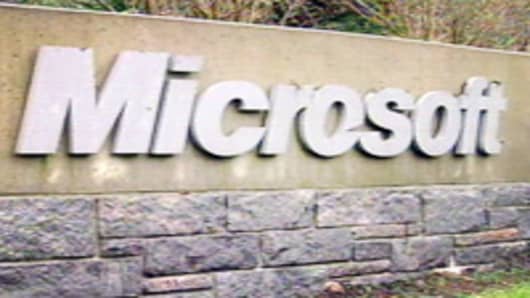Microsoft was fined a record 899 million euros ($1.35 billion) by the European Commission on Wednesday for using high prices to discourage software competition in the latest sanction in their long-running battle.
The executive arm of the European Union said the U.S. software group defied a 2004 order from Brussels to provide the information on reasonable terms.
Microsoft has now been fined a total of 1.68 billion euros by the EU for abusing its 95 percent dominance of PC operating systems through Windows.
Its latest fine far exceeded the original and was the biggest ever imposed on a company.
"Microsoft was the first company in 50 years of EU competition policy that the Commission has had to fine for failure to comply with an antitrust decision," Competition Commissioner Neelie Kroes said in a statement.
For years after the decision Microsoft said it was making every effort to comply with the Commission's orders.
"Talk is cheap, flouting the rules is expensive," Kroes said. "We don't want talk and promises. We want compliance."
Microsoft said in a statement the fines concerned "past issues" and it was now looking to the future.
The Commission said in a landmark 2004 ruling, upheld by an EU court last year, that Microsoft had withheld needed interoperability information for "work group server" software.
Rivals Shrivelled
Rival makers of work group servers, which operate printers and sign-ons for small office groups, saw their markets shrivel because Microsoft stopped providing information they needed to hook up to Windows office machines.
Even after the 2004 decision and a 497-million euro fine Microsoft dragged its feet, giving incomplete documentation and charging high royalties, the Commission said.
"I hope that today's decision closes a dark chapter in Microsoft's record of non-compliance with the Commission's March 2004 decision," Kroes said.
The latest decision picks up from where a 280.5 million euro fine for non-compliance left off, covering the period from June 21, 2006 until Oct. 21, 2007. After losing a major court decision in September 2007, Microsoft capitulated.
Last week it promised to publish critical information so rival programmes worked better with Windows.
That came as the company was facing this week's fine and perhaps even more important, two new formal Commission investigations opened in January.
"As we demonstrated last week with our new interoperability principles and specific actions to increase the openness of our products, we are focusing on steps that will improve things for the future," Microsoft said on Wednesday.
The new Commission investigations relate to the issues of the 2004 case but with different products.
The Commission said in 2004 that Microsoft tied its Windows Media Player to Windows. Opera, maker of a Web browser, said Microsoft has done the same with Internet Explorer.
The new interoperability question concerns Microsoft Office and the difficulty for documents from rival systems to interoperate with Word and other Office products.
Kroes took a wait-and-see attitude about Microsoft's announcement of last week, noting it had promised change on four other occasions without results.
"A press release, such as that issued by Microsoft last week on interoperability principles, does not necessarily equal a change in a business practice," she said.



